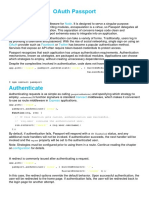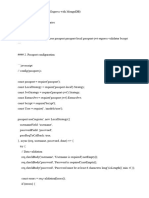0% found this document useful (0 votes)
9 views2 pagesMERN Auth Guide
The document discusses authentication methods in the MERN stack, focusing on Passport.js, session-based authentication, and JWT. It outlines the advantages and disadvantages of each method, including their storage mechanisms and best use cases. Additionally, it provides a summary table comparing these concepts and an example use case involving Node, Express, and React.
Uploaded by
Ayush YadavCopyright
© © All Rights Reserved
We take content rights seriously. If you suspect this is your content, claim it here.
Available Formats
Download as PDF, TXT or read online on Scribd
0% found this document useful (0 votes)
9 views2 pagesMERN Auth Guide
The document discusses authentication methods in the MERN stack, focusing on Passport.js, session-based authentication, and JWT. It outlines the advantages and disadvantages of each method, including their storage mechanisms and best use cases. Additionally, it provides a summary table comparing these concepts and an example use case involving Node, Express, and React.
Uploaded by
Ayush YadavCopyright
© © All Rights Reserved
We take content rights seriously. If you suspect this is your content, claim it here.
Available Formats
Download as PDF, TXT or read online on Scribd
/ 2
























































